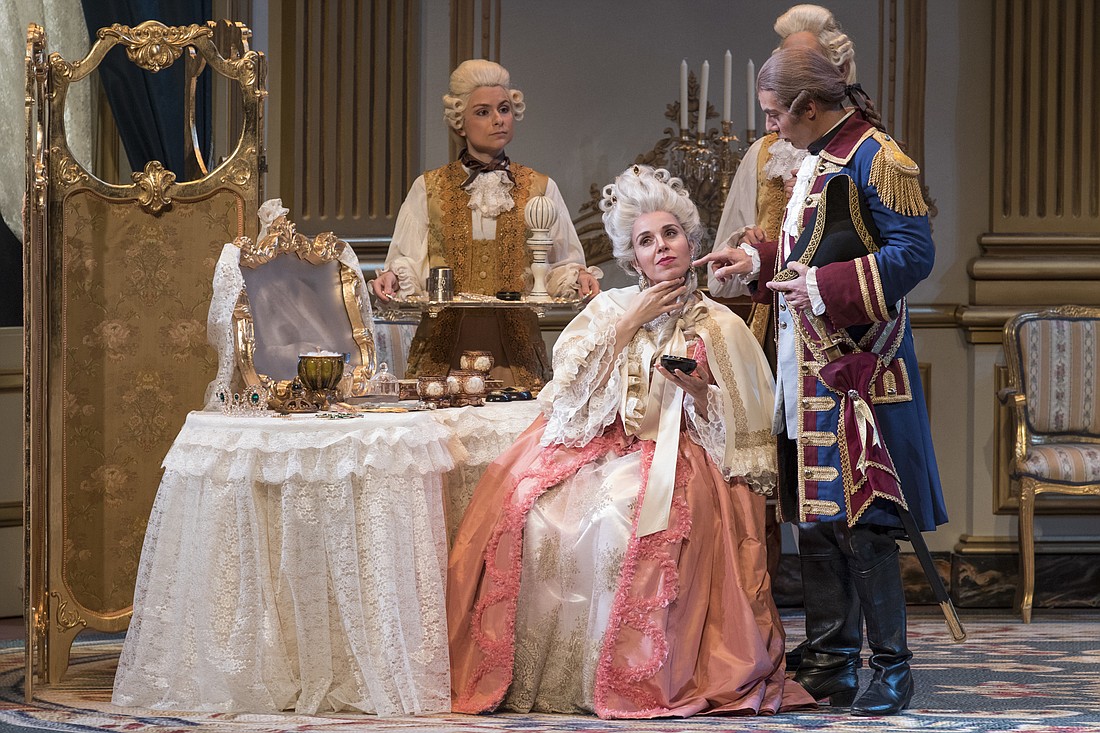- April 29, 2025
-
-
Loading

Loading

Last Saturday night Paris came to Sarasota as the Sarasota Opera opened its Winter Festival season with a lavish new production of Puccini’s “Manon Lescaut.”
The adage “third time’s a charm” certainly worked for Puccini and “Manon Lescaut,” since it was his third opera, establishing him as the likely successor to Verdi, and also the third opera based on the 1731 novel by Abbé Prévost. Puccini’s opera was preceded by Auber’s “Manon Lescaut” and Massenet’s better known “Manon,” both premiering much earlier.
Distilling the Prévost novel into a workable opera libretto for Puccini was obviously not an easy task, since no fewer than five people labored over the telling of this tragic story of Manon and her lover, the Chevalier Des Grieux, with Puccini himself contributing text to the final version. What emerged, however, is a tribute to Puccini’s innate sense of theater, with a series of concise episodes moving inexorably toward Manon’s final demise in the arms of her lover, all the while propelled by his soaring melodies.
The excellent cast is led by soprano Sandra Lopez as Manon, returning after a thrilling debut in last season’s “Dialogues of the Carmelites.” Her Manon is captivating, with a commanding presence on stage, especially in Act 2, where she shines in all the grandeur of Geronte’s palace. Lopez has a slight flutter in her voice and a tendency to sing on top of the pitch, but as Manon, it seems to serve her well, making Manon appear even more vulnerable and exciting. Her performance of Manon’s two great arias, “In quelle trine morbide,” and “Solo, perduta, abbandonata,” were beautifully sung and highlights of the evening.
Lopez is equally partnered by the Des Grieux of tenor Matthew Vickers. His ascendance from Apprentice Artist and Studio Artist, to full Artist status, is a tribute not only to his vocal growth, but also to the loyalty and progression of the apprentice program of Sarasota Opera. Vickers’ voice, though somewhat covered in mid range, opens up with glorious sound on top, and his aria “Donna non vidi mai” was sung with artful passion. He was obviously madly in love at first sight.
Equally impressive was Filippo Fontana as Manon’s brother, Lescaut. Fontana’s rich, virile baritone voice, as well as his acting, gave us a wonderful portrayal of a loving and sympathetic brother, sincerely trying to help his sister and her lover.
Costas Tsouriakis, who sang Geronte, Manon’s spurned and vengeful benefactor, is also a graduate of Sarasota Opera’s Apprentice and Studio Artist Programs. His characterization was rich and menacing, although vocally he was a bit in the shade of his colleagues.
Sometimes performances of smaller roles make impressions as striking as the leading ones, and we realize how important they are to an opera vocally and dramatically. Sean Christensen, appearing in no fewer than three roles, is an excellent example. As the student Edmondo in Act 1, he sang with a lovely lyric sound and moved well, as the Dancing Master in Act 2 he was appropriately haughty and bemused, and in his brief appearance as a Lamplighter in Act 3, he showed us that every character, no matter how small his role, can be impressive.
Sarasota Opera veteran Young Bok Kim was equally valuable in his dual capacity of Innkeeper and Sergeant of the Archers. Smaller roles were well sung by Arnie Chester as a Castrato, Peter Morgan as Naval Captain, and Jonathan Harris as an overly fussy Hairdresser in Act 2.
The apprentice chorus, under Roger Bingaman was as effective dramatically as it was vocally, in spite of some rather tenuous moments at the beginning which were out of sync with the orchestra. Likely just a bit of “opening night-itis,” all was soon well again, and the chorus of Castrati in Act 2 was lovely.
Conductor Victor DeRenzi never overpowered the singers, and the orchestral sound was especially lovely during the famous Intermezzo preceding Act 3. The haunting string melodies in the beginning of Act 4 were borrowed by Puccini from his early string quartet, “Chrysanthemums.” While DeRenzi’s conducting of Verdi’s music is excellent, his Puccini interpretations, although lyrical and moving, could at times be less rigid, allowing for more of the give and take elasticity that is inherent in all of Puccini’s scores.
Were it not for this excellent cast of singers, all responding well to the excellent stage direction of Stephanie Sundine, this could have been an opera in which the sets, costumes and lighting could have easily stolen the show. David Gordon’s sets were well designed and painted, especially the opulence of his Act 2 set for Geronte’s house in Paris, replete with gold leaf on white walls and a stunning chandelier. His backdrop for the harbor setting in Act 3 included a large ship that was rendered even more impressive by a visually eloquent sunrise, a wonderful example of Ken Yunker’s sorcery in lighting design. Never to be outdone, Howard Tsvi Kaplan’s costumes were appropriately elegant as always, and all were made in the Costume Shop of the Sarasota Opera. The endless number of period wigs were in the able hands of Brittany Rappise.
From every viewpoint, Sarasota Opera’s opening production of “Manon Lescaut” is indeed an impressive opening its 59th season.